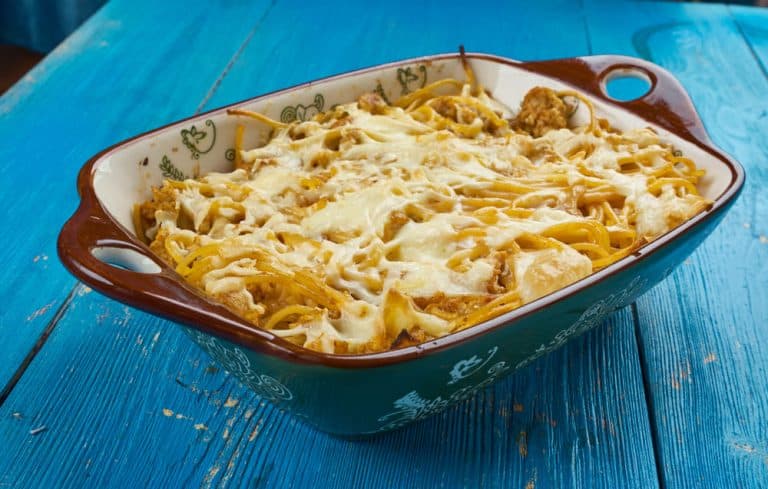This pasta bake is done in one pan and doesn’t require you to even boil the pasta first. Yes, that means the pasta is cooked in the oven! It’s amazing how delicious it is when you literally only need to spend 5 minutes prepping it. This one is going to save your weeknights for sure!
I honestly hate the phrase “dump dinners” or “dump-and-go dinners” where you dump everything into a cooking vessel and that’s all you have to do. I dislike the phrase, for sure. But, I love the concept!
Truly my favorite way to cook is to put everything on a sheet pan or in a casserole dish, put it in the oven, and then walk away.
I was never sure if you could cook pasta in the oven like that though. Until I started working on this recipe. Then I learned that the answer is yes, you can absolutely cook pasta in the oven. You just need the right amount of liquid, and a delicious recipe.
You’re going to be amazed by this recipe. You literally just put everything into a baking dish, cover it, put it in the oven, and walk away.

How To Cook Pasta In The Oven
The details about the no-bake pasta bake are below. But I often get asked if you can cook pasta in the oven for other purposes. That’s what I’m explaining here first:
I haven’t had great success cooking pasta in water in the oven. The best way to do it is to preheat your oven to 400°F. Then put your pasta in a baking dish or oven-safe pot. If it’s long pasta, like spaghetti, you need to break it up into small pieces (2 inches). The reason is that all of the pasta will need to be submerged in liquid the entire time it’s in the oven and long strands are more likely to jut out.
Then add boiling water to the pan. Use a kettle to boil the water, or boil it on the stove. Although, if you have a functioning stove, I suggest you cook your pasta on there since it turns out better. This is more for when you don’t have a stove. (The reason it turns out better is that the water is able to simmer continuously on the stove. In the oven, it doesn’t seem to stay up at that temperature and the pasta ends up a little bit gummier. It’s perfectly edible and good. Just a bit gummier.)
Make sure the pasta is completely submerged in the very hot water. Add salt, about a tablespoon for 16 ounces of pasta, and stir.
Cover the dish with a tight-fitting lid or aluminum foil. You really want it to have a tight seal. A double layer of foil does this well.
Then put it into the oven for 5 minutes more than what is stated on the pasta box instructions. Test the pasta to see if it is to your liking, and then drain off the water.
Why Does The Pasta Bake Need To Rest?
The pasta bake is going to come out seeming liquidy. That’s because all of the liquid in the casserole has been really simmering and moving all around due to the intense heat.
What you want is for that liquid to simmer down (lol). But seriously, you want it to stop simmering and settle down. As it settles, it will evaporate a bit, soak into the pasta a bit more, and thicken up.
So absolutely, let it sit on the counter for 15 minutes uncovered before serving. It will still be nice and hot for eating, it just won’t be so wet.
And there you have it: Delicious baked pasta all done in one pan with virtually zero work. Brilliant, right?
MeMe’s Recipes | Chicken and Noodle Casserole
Can you put noodles in a casserole?
It is somehow possible to put your noodles along with all the other ingredients in the casserole only if you do not have extra time to spend. For this, you need to get pre-boiled noodles and then put them into the casserole along with all other ingredients. It is not a good idea, yet it may earn you some noodles to eat.
Do noodles need to be cooked before cooking?
Yes. The noodles in this recipe need to be cooked before put the casserole in the oven. Also, the noodles should be cooked to “al dente” so they don’t get mushy in the oven. If you don’t have seasoned bread crumbs, add 1/2 tsp of all purpose seasoning to 1/4 cup of plain bread crumbs for this recipe.
How do you cook chicken noodle casserole?
In a large mixing bowl mix together chicken with cream of chicken soup, sour cream, and frozen veggies. Once mixed season with salt, pepper, onion powder, and garlic powder. Add in noodles then place mixture in your prepared casserole dish. Top casserole with cheese then bake for 25-30 minutes.
Do you boil egg noodles before cooking?
Yes! You’ll want to boil your egg noodles until they are just shy of al dente—they should still have a little toughness to them. They will cook the rest of the way while the casserole is in the oven, and they will come out perfectly cooked, rather than mushy.
